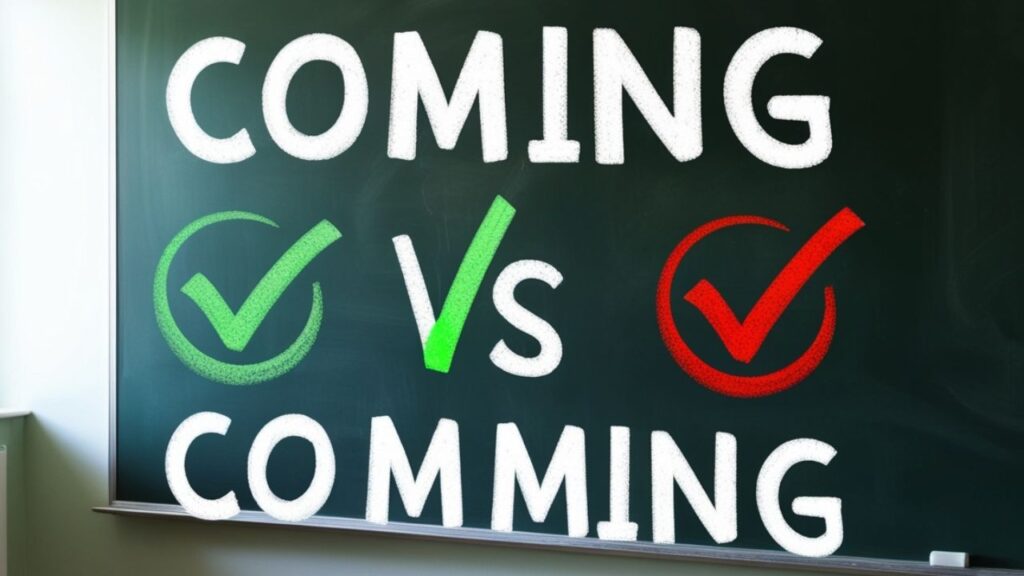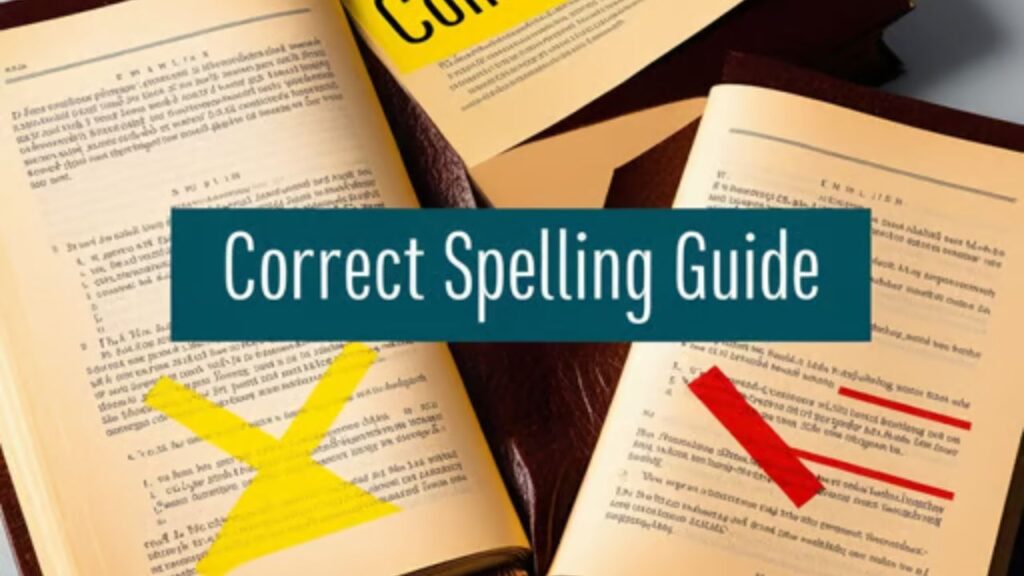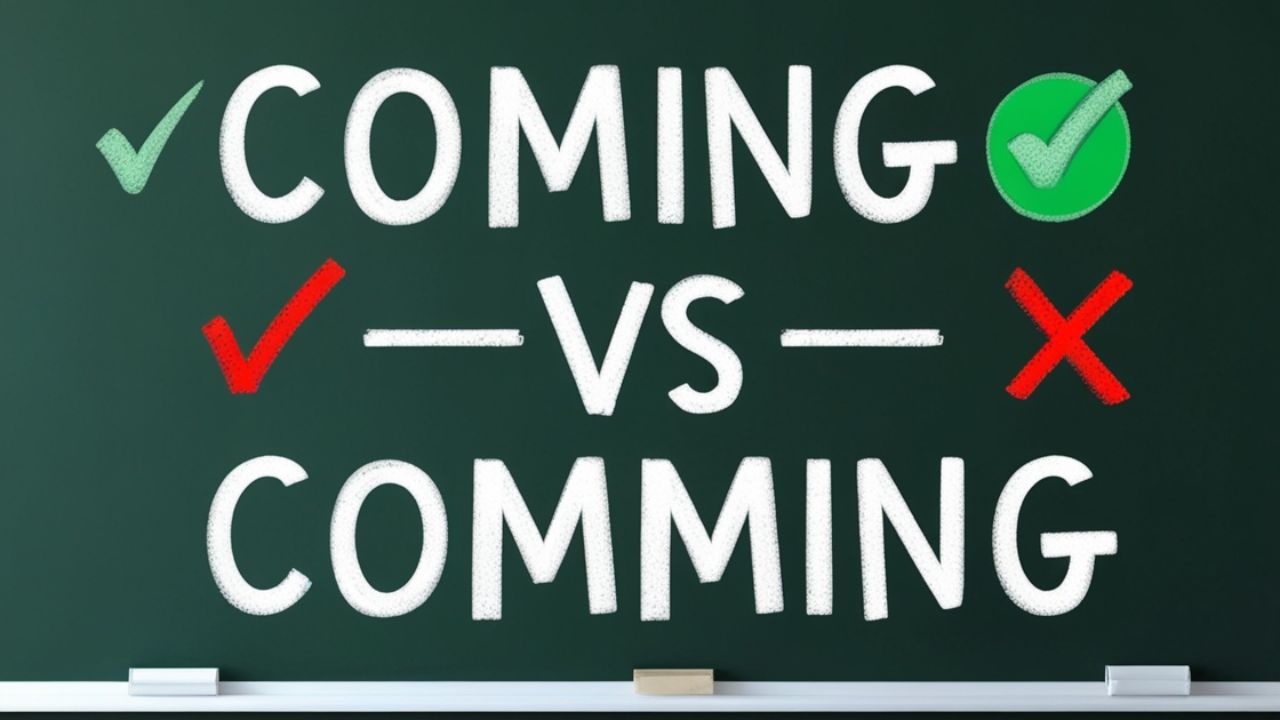Comming vs Coming often confuses learners. The correct word is always coming, which means to arrive or move closer. The spelling comming is not correct in English writing.
When we add “-ing” to the verb “come,” it becomes coming. This rule follows normal grammar patterns. Using comming is a mistake that can make sentences look wrong.
Practice helps you remember the right form. Write simple sentences like “I am coming home” or “She is coming soon.” This builds strong spelling and grammar skills.
Why “Coming” Is The Correct Spelling
The word coming is the right spelling in English. It shows the action of arriving or moving closer. The spelling comming is wrong and not used in correct writing.
English words follow simple rules. When we add “-ing” to the verb come, it becomes coming. This makes sentences clear and correct, while comming only creates spelling mistakes.
Historical Context
The word coming started in Old English from the word “cuman,” which meant to arrive. Over time, the spelling changed, but coming stayed the correct and accepted form.
English spelling rules grew slowly with history. The verb come followed these rules, and when “-ing” was added, it became coming. The spelling comming never became part of standard English.
Example Scenario
Imagine you invite friends for dinner. You say, “My friends are coming at seven o’clock.” The word coming shows that people are arriving at your place.
At school, a teacher might say, “The exam is coming next week.” Here, coming explains something that will happen soon, making the sentence clear and correct.
Understanding “Coming” in Grammar
The word coming works as a verb form. It shows an action happening now. Sentences like “I am coming home” make the meaning simple and easy to understand.
Sometimes coming also works as a noun. In “The coming of spring,” it means arrival. This shows that coming has different uses in grammar and everyday English.
Usage in Different Contexts
The word coming can show an action, like “She is coming to school.”
It can also mean arrival, like “The coming of winter is near.”
In stories, coming helps explain what will happen soon.
Teachers use coming when talking about future lessons.
Friends say coming when they are on the way.
See also Pick-Up, Pick Up or Pickup: Correct Usage Explained
Example Scenario
A boy tells his mother, “I am coming to the kitchen for food.” Here, coming shows movement and makes the sentence clear and correct for everyday use.
A teacher says, “The holiday is coming next month.” The word coming here explains the arrival of time, making the meaning simple and easy for children to understand.
The Misconception of “Comming”

Many learners think comming is correct, but it is only a spelling mistake. The right word is always coming, which shows action or arrival in proper English.
The error comming happens because some words double letters before adding “-ing.” However, the verb come does not follow this pattern, so the true form is coming.
Why This Error Occurs
The mistake comming occurs because learners see other words like “swim” becoming “swimming.” They think the same rule applies to coming, but this is incorrect spelling.
English spelling rules can be tricky. The verb come only adds “-ing” without doubling the “m.” That is why the correct form is always coming, not comming.
Impact on Communication
Using comming instead of coming makes writing look wrong. Readers may get confused and think the writer does not know proper spelling. Correct words build trust in communication.
In school or work, spelling coming correctly shows care and knowledge. Writing comming can reduce clarity, while coming always makes sentences easy, professional, and simple to understand.
Tips to Overcome Confusion
- Always remember that coming is the correct spelling.
- Practice writing coming in short sentences daily.
- Use a dictionary to check the word coming.
- Read books and notice how coming is used.
- Use spelling apps to avoid writing comming.
Words That Sound Like “Comming”
Some words sound like comming, but they have different meanings. For example, coming means arriving, combing means fixing hair, and “cumming” is used in other special contexts.
These words may confuse learners because they sound similar. Knowing that coming is the correct spelling will help you avoid mistakes and use English words in the right way.
| Word | Definition |
| Coming | The act of arriving or approaching |
| Cumming | A colloquial term often used in specific contexts |
| Combing | The act of untangling or arranging hair |
Overview of Homophones
Homophones are words that sound the same but have different meanings and spellings. The word coming and the word combing are examples of homophones in English.
Learning homophones helps children understand why spelling is important. If you mix words like coming and combing, the sentence changes meaning. Correct spelling keeps communication easy and clear.
Example Scenario
A child says, “I am coming to play with you.” If the child writes comming, the word looks wrong, and the meaning may confuse the reader or listener.
Another example is, “She is combing her hair.” If someone writes coming instead of combing, the sentence changes meaning. Correct spelling keeps English clear and easy.
Can “Coming” Function as a Noun?
Yes, the word coming can also work as a noun. In this case, coming means the arrival of something, like “the coming of spring” or “the coming holidays.”
When coming is used as a noun, it names an event or arrival. Sentences like “the coming year will be fun” show how the word works differently from its verb form.
Examples of Noun Usage
The word coming works as a noun in sentences like “The coming of rain makes farmers happy.” Here, coming shows the arrival of an important event.
Another example is, “The coming holidays will be full of joy.” In this case, coming names a future time, making the sentence clear and meaningful for the reader.
- The coming of summer brings warm days.
- Everyone waited for the coming of the teacher.
- The coming holidays made children excited.
- The coming of rain helped the plants grow.
- She looked forward to the coming year.
Distinctions in Usage
The word coming as a verb shows action, like “She is coming to school.” As a noun, coming names an event, like “The coming of spring is near.”
Understanding this difference helps children use coming correctly. As a noun, it describes arrival or a future event, while as a verb, coming shows movement happening now.
Example Scenario
A teacher says, “The coming exams will start next week.” Here, coming works as a noun, showing the arrival of an event that students must prepare for.
A boy says, “I am happy about the coming holidays.” In this sentence, coming describes the future time of holidays, making the meaning easy and clear.
The Opposite of “Coming”
The opposite of coming is words like going or leaving. While coming means arrival, going and leaving show movement away from a place or event.
For example, “The guests are coming to the party” means arriving. But “The guests are leaving the party” means the opposite, showing departure instead of arrival.
Examples of Antonyms
- The guests are coming, but later they are leaving.
- She is coming to school, but her brother is going home.
- The train is coming, and then it is leaving again.
- Friends are coming to play, while others are going away.
- The teacher is coming to class, and the students are leaving after school.
See also Pre vs Post: Master Prefix Usage for Clear Writing
Contextual Usage
The word coming can mean different things depending on context. In “the coming rain,” it shows the arrival of weather. In “the coming year,” it means a future time.
Using coming correctly makes sentences clear. As a noun, coming explains an event or arrival. Context helps readers understand whether it means time, weather, or special events.
Commonly Misspelled Words in English
The word coming is often written wrongly as comming. Other hard words include “separate,” “definitely,” and “occurrence.” Learning correct spellings helps children write English with confidence.
Many learners forget letters or add extra ones. By practicing coming and other tricky words, students can improve their writing skills and avoid common mistakes in English spelling.
| Word | Correct Spelling | Common Mistake |
| Definitely | Definitely | Definately |
| Separate | Separate | Seperate |
| Occurrence | Occurrence | Occurence |
Tips for Recognizing Misspellings
- Always check if words like coming look correct in a dictionary.
- Read books to see how coming and other words are spelled.
- Practice writing tricky words daily to avoid misspellings.
Tips for Improving Your Spelling Skills

Good spelling needs practice. Writing words like coming every day will make them easy to remember. Reading books and stories also helps children learn correct spellings naturally.
Using a dictionary builds strong spelling habits. Spelling apps can also guide learners. By repeating coming and other words, students improve quickly and feel confident in English writing.
Regular Practice
Daily practice makes spelling strong. Writing coming in short sentences helps children remember the correct form. Simple exercises turn coming into a word they will never forget.
Teachers often give spelling tasks for regular practice. By repeating coming and other words, students build memory and confidence. Practice is the best way to improve spelling skills.
Utilize Technology
Children can use phones or computers to learn spellings. Spell check tools highlight mistakes like comming and suggest the right word coming. This makes learning easier and faster.
Educational apps are useful for practice. Games and quizzes show the correct form of coming and other words. Using technology helps students improve spelling while enjoying learning.
Engage with Language
Reading short stories and simple books helps children learn spellings. Seeing coming many times in sentences makes the word easy to remember. Daily reading builds stronger spelling skills.
Speaking and writing activities also support learning. When students use language in class or at home, they practice spelling naturally. This way, engage with language improves confidence and memory.
Example Scenario
A boy writes in his notebook, “I am comming to school.” His teacher explains the correct word is coming. The child learns the right spelling through guidance and practice.
During reading, a student sees the word coming in a storybook. The repeated use helps the student understand the correct spelling. This example scenario shows how mistakes turn into learning.
Final Words
The word coming is the correct spelling, and it is very important to remember. Using the wrong word like comming creates mistakes. Learning spelling rules helps students write better and understand English more clearly.
Practicing daily with reading and writing makes spelling easier. Teachers, parents, and friends can give support. With small efforts, students improve. This conclusion reminds us that correct spelling builds strong confidence in learning.
FAQs
Why is it coming and not comming?
It is coming because the root word is come. English rules drop the silent e before adding -ing, so “comming” is wrong.
What is the meaning of comming soon?
The word comming is a spelling mistake. The correct phrase is coming soon, which means something will happen or appear in the near future.
When to use a coming?
Use a coming when talking about an event that is near or expected. Example: “We are excited about a coming celebration.”
Is “I’m coming” grammatically correct?
Yes, I’m coming is grammatically correct. It means the speaker is on the way or moving toward a person, place, or event.

Join Bibcia on a journey to master English grammar. Discover easy lessons, writing tips, and practical examples designed to make learning grammar simple and effective.










